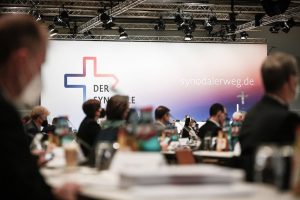BONN, Germany (CNS) — The plenary assembly of the German Synodal Path meeting in Frankfurt Sept. 8-10 will start by debating a 32-page text on sexual morality, which could be adopted at the meeting, as could eight other texts, some of which contain far-reaching proposals for reforms in the church.
In terms of church policy, the 14 texts being considered for first or second reading fall into two categories: those that can be adopted without approval from Rome and lead to concrete changes in Germany, and those where the decision-making power rests with the Vatican.
The German Catholic news agency KNA reported the reform of church labor law falls into the first category. Currently, the law allows the church to dismiss people living in a homosexual partnership. A liberalization is widely expected.
The second category includes texts that propose the ordination of women and call for the relaxation of priestly celibacy, KNA reported. On the latter point, the German reformers can also refer to calls for change from elsewhere in the universal church, for example from the Amazon region.

Increasingly, questions are being asked about the powers of the Synodal Path. In a statement issued in July, the Vatican said the Catholic reform project in Germany “does not have the faculty to oblige bishops and the faithful to assume new forms of governance and new approaches to doctrine and morals.” Those who have been warning about Germany taking a special path on reform and causing a schism in the church can draw on these words. But the reformers appear undaunted.
“It remains to be seen whether the there is a willingness to reform and, above all, to take action that corresponds with the increased awareness in recent months regarding the grave problems in the life of the church,” Erfurt theologian Julia Knop, one of the leading thinkers of the reform movement, told KNA.
The bishops taking part in the Frankfurt meeting are likely to have a stronger focus on the Vatican than they did in the previous assemblies. Rome has launched the second phase of the worldwide Synod of Bishops on synodality initiated by Pope Francis. In autumn 2023, this process is to culminate in a large assembly of bishops, in which several German bishops will participate. This will be the forum where groundbreaking decisions can be made and passed on as recommendations to the pope.
The aim is for the Synodal Path in Germany to feed into this process in some form. Cardinal Mario Grech, secretary-general of the Synod of Bishops, recently told KNA he continues to have confidence in the Synodal Path. But so far, the Vatican has not even invited the presidium of the Synodal Path for a meeting, KNA reported, adding it was not yet clear how Rome’s cold shoulder would affect the course of the plenary assembly in Frankfurt.
Bishop Bertram Meier of Augsburg has stressed that the Synodal Path is being closely watched abroad. He said that in Poland in particular, he had heard concerns “that our Synodal Path in Germany could aspire to goals that overstep the Catholic framework.”
He added: “It isn’t the change of the ‘system’ of the church that is needed; instead, we have to answer the question: How can we proclaim Jesus Christ and his Gospel to the people of today?” Many people unsettled by crises did not want a new, completely different church, but a spiritually renewed church, he said.
Bishop Meier is in charge of international matters for the German bishops’ conference and is well connected in the Vatican, where he worked several years in the Secretariat of State. He expressed his views in the Katholische SonntagsZeitung newspaper.
The German bishops’ conference and the Central Committee of German Catholics launched the Synodal Path in 2019 in the wake of Germany’s clerical abuse scandal. The process includes forums in which questions are discussed and assemblies at which people from the forums report back and proposals are discussed and voted on. Some texts not only must receive approval of more than two-thirds of all delegates, clerical and lay, but also must have the approval of more than two-thirds of the bishops.






















